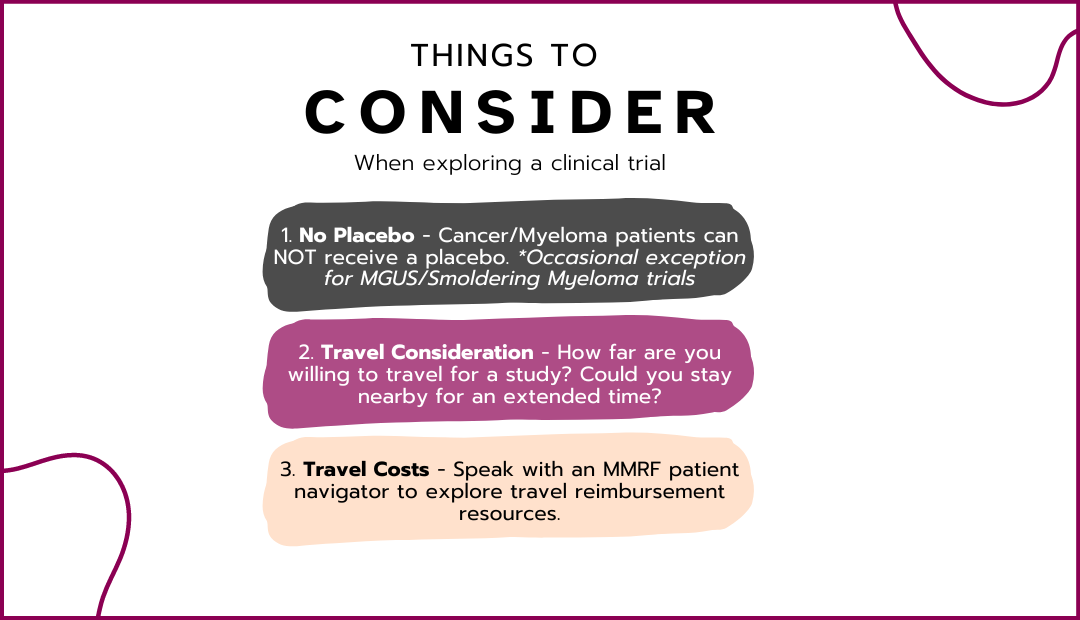Elotuzumab, CC-92480, and Dexamethasone for the Treatment of Relapsed or Refractory Myeloma After CD38- and BCMA-Targeted Therapies
NCT05981209
Age 18 +
Sex Both
Phase Phase 1
Third Opinion Trial Synopsis
In this clinical study, researchers are exploring a new treatment approach for patients with a specific type of blood cancer. The study focuses on using a combination of therapies to improve patient outcomes. Here are some key points about the study:
- The treatment involves a unique combination of existing therapies that have shown promise in previous studies.
- Patients will receive personalized treatment plans based on their individual health needs and responses to therapy.
- The study aims to assess the effectiveness of this combination therapy in reducing symptoms and improving quality of life for patients.
- Researchers are also looking at how well patients tolerate the treatment and any potential side effects.
- This study is notable for its focus on tailoring treatments to individual patients, which may lead to better outcomes compared to standard approaches.
- Participants will be closely monitored throughout the study to gather data on their progress and response to the treatment.
Third Opinion AI Generated Synopsis
Trial Summary
This phase Ib trial tests the safety, side effects, and best dose of CC-92480 in combination with elotuzumab and dexamethasone in treating patients with multiple myeloma that has come back after a period of improvement (relapsed) or that does not respond to treatment or has not responded to previous treatment (refractory). Multiple myeloma (MM) remains the second most common hematologic malignancy in the United States. A number of therapies have been approved for patients with MM, including CD38- and B-cell maturating antigen (BCMA)-targeted therapies (antibody and plasma cell treatments that help the body's immune system to kill cancer cells); however, patients will often relapse and become refractory to these therapies. Because of this, it is important to identify effective treatment options for patients progressing on anti-CD38 therapy and BCMA-directed therapies. Elotuzumab is a humanized IgG1 monoclonal antibody, which is a type of protein that can bind to other target cells to prevent them from working the way they should or cause them to act differently. Elotuzumab works by targeting a protein called SLAMF7, which is present on myeloma cells, and makes it easier for the immune system to target the cancer. CC-92480 works by binding to a protein called CRBN that triggers the breakdown of proteins: Ikaros and Aiolos, leading to cell death in multiple myeloma cells. Dexamethasone is a synthetic adrenocortical steroid, or steroid normally naturally made by the adrenal gland in the brain which has been produced in a laboratory, that helps to regulate the amount of different chemicals and water that are being processed by the kidneys. It is also used in patients with myeloma to help treat their disease. The combination of CC-92480 with elotuzumab and dexamethasone may be a safe and effective treatment when given to patients with relapsed or recurrent MM.
This phase Ib trial tests the safety, side effects, and best dose of CC-92480 in combination with elotuzumab and dexamethasone in treating patients with multiple myeloma that has come back after a period of improvement (relapsed) or that does not respond to treatment or has not responded to previous treatment (refractory). Multiple myeloma (MM) remains the second most common hematologic malignancy in the United States. A number of therapies have been approved for patients with MM, including CD38- and B-cell maturating antigen (BCMA)-targeted therapies (antibody and plasma cell treatments that help the body's immune system to kill cancer cells); however, patients will often relapse and become refractory to these therapies. Because of this, it is important to identify effective treatment options for patients progressing on anti-CD38 therapy and BCMA-directed therapies. Elotuzumab is a humanized IgG1 monoclonal antibody, which is a type of protein that can bind to other target cells to prevent them from working the way they should or cause them to act differently. Elotuzumab works by targeting a protein called SLAMF7, which is present on myeloma cells, and makes it easier for the immune system to target the cancer. CC-92480 works by binding to a protein called CRBN that triggers the breakdown of proteins: Ikaros and Aiolos, leading to cell death in multiple myeloma cells. Dexamethasone is a synthetic adrenocortical steroid, or steroid normally naturally made by the adrenal gland in the brain which has been produced in a laboratory, that helps to regulate the amount of different chemicals and water that are being processed by the kidneys. It is also used in patients with myeloma to help treat their disease. The combination of CC-92480 with elotuzumab and dexamethasone may be a safe and effective treatment when given to patients with relapsed or recurrent MM.
from ClinicalTrials.gov
Locations & Contact
Fill out the form and to let the Multiple Myeloma Research Foundation know you are interested in this trial.
Contacts:

